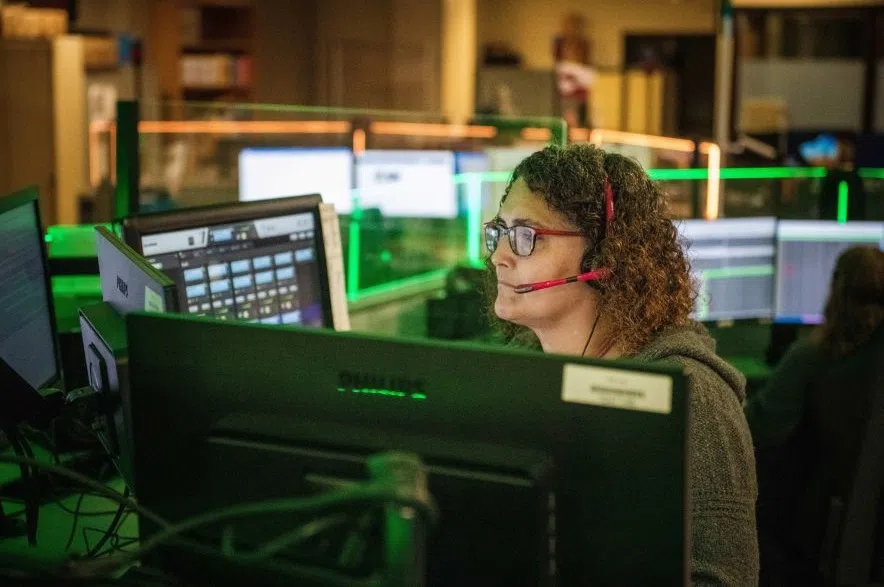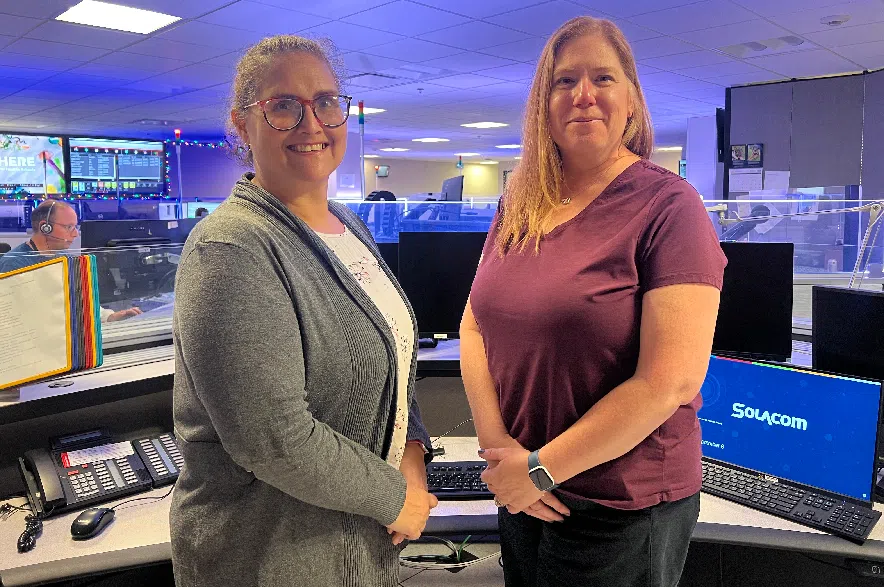For the unseen voices on the other end of a 911 call, staying calm in the chaos and guiding people through the worst moments of their lives is not just a job. It’s a calling.
Dispatchers and call takers at the Saskatchewan RCMP’s Operational Communications Centre are often the first point of contact for people in life-threatening emergencies, helping to ensure officers get to the right place, at the right time.
Read more:
- Abandoned at birth, Regina man still hopes to thank the mother he’s never met
- ‘When has a cult ever turned good?’: Richmound mayor describes aftermath of raid
- Manitoba man hit by RCMP vehicle in Yorkton, SIRT investigating
Communications centre recruiter Lee Rosin has been a calm voice behind the phone for more than 20 years.
“It starts and ends with us, in some ways, because if we don’t maintain control we can’t get officers safely to wherever officers need to go. The system breaks down right at the front end, so we try our very level best to maintain control,” Rosin explained.
From car crashes to violent crimes to non-emergencies, Rosin and the team respond to it all.
Listen to the story on Behind the Headlines:
“Whatever type of call it is, it’s going to dictate the questions that I ask. We become accustomed to remaining in control regardless of what we hear on the other end. It might be screaming, it might be somebody yelling out an address, it might be somebody talking off because people don’t know that they’ve called 911, so I think we grow accustomed to hearing that and then react accordingly,” she added.
Rosin described the job as exciting, challenging, and empowering, pointing to a recent study that showed only four per cent of the population could do the job.
“On the tough days, I just remember and remind myself when I’m walking to my car. ‘Four per cent. You’re in the four per cent, lady,’” she said.

Dispatchers with the Saskatchewan RCMP respond to everything from car crashes to violent crimes to non emergencies, making sure officers get to the right place at the right time. (Saskatchewan RCMP/Submitted)
Operations commander Dione Matt said dispatchers at the centre field an average of around 30,000 calls each month.
“It is a lot, and every year we see a bit of an increase with that as well,” she said.
“There was a bit of a change after COVID had hit. Just the way our world is different after having something like that happen to everybody, because it affected everybody in the world. But I’m not sure why (there has been an increase) other than that. Just every year it’s a little bit more.”
Matt has been in the career for nearly 18 years, and said one thing that has made her stick around after all these years is the fact that no two days are ever the same.
“It’s exciting. During those busy times, for adrenaline junkies, it’s an adrenaline rush because you have all of these things going on at the same time, and it’s never boring,” she said.
“You may have calls that are similar, but they’re never the same, and I get to help somebody when I’m here, so that makes me feel good.”
But while the job is often exciting, it isn’t easy.
Matt said even when she has to answer the toughest calls, she knows she must stay calm because it’s what the victims need most.
“I remind myself to keep it together and keep it going so I can help them,” she said.
Matt said the hardest call she had to take came during a school shooting in La Loche in 2016.
“I have two children, and you always heard it on the news and all of these other places, and nothing like that had happened in Saskatchewan, but suddenly this was now happening in Saskatchewan,” she said.
“I could envision my own boys being in that school when that person came in to harm them, so that really hit home for me.”
Matt said their family support in the office also extends to their second family, their coworkers.
“We all celebrate our highs and lows, our family and our work family,” she explained.
“I can go home and talk to my husband, and I will say ‘this person, that person,’ and they know if they have two kids, four kids, that they’re buying a new house or they’re looking to retire, whatever it might be. I have two families: my work family and the family at home.”
Rosin said there are tight bonds within the team, and they frequently become best friends.
“You just go through the trenches together. You take big calls or you take emotional calls. Many of us are moms, and we live with these people 48 hours a week. There are times when we know more about your supervisor’s personal life than maybe her husband does that week, until she tells him she got a speeding ticket,” Rosin said with a chuckle.
“But that’s one of the best things about this job. We have that human element when we’re dealing with horrific situations. We’re reminded that we are human and that we have families and support behind us that’ll help us get through the tough days.”











